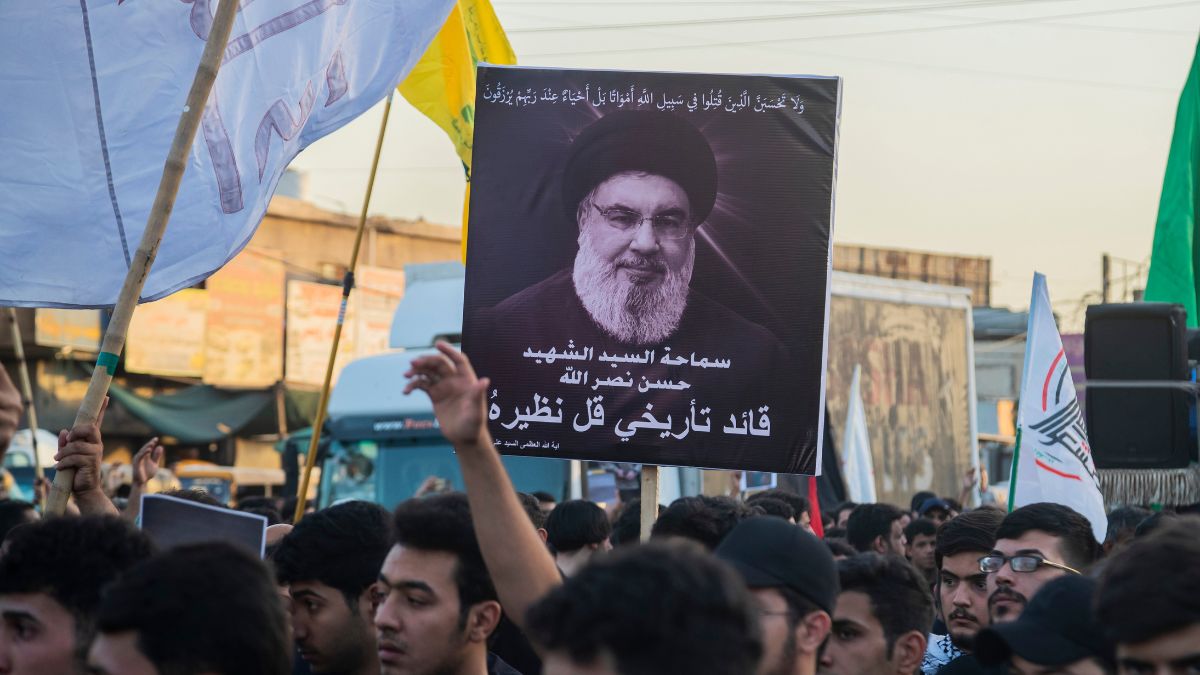Countries like UAE and Bahrain have kept silence while Saudi Arabia and Egypt did not mention Hassan Nasrallah's name while urging to preserve Lebanon's sovereignty
BAHRAIN IS A SHIA MAJORITY UNDER SUNNI RULE BY COUSINS OF SAUDI ARABIA
Web Desk Updated: September 30, 2024

Web Desk Updated: September 30, 2024

Iraqi Shiites hold pictures of Lebanon's Hezbollah leader Sayyed Hassan Nasrallah, who was killed by an Israeli airstrike in Beirut, during a symbolic funeral in Sadr City, Baghdad, Iraq | AP
After Israeli military killed Iran-backed Hezbollah chief Hassan Nasrallah, Sunni states in the Arab world have maintained silence on the issue. This has brought forward the rift among Arab countries over historical Sunni and Shia ideologies as well as geopolitical equations in the region.
While Iran and its allies in Iraq and Syria have condemned the assassination of Nasrallah, the Gulf countries led by Saudi Arabia and other Arab League nations have taken a different stance. Syria and Iraq have declared a three-day mourning period
Though the Arab League designated Hezbollah as a terrorist organisation in 2016, it was retracted earlier this year.
Saudi Arabia has stated that the situation in Lebanon is of "grave concern", urging the preservation of the sovereignty and regional security of the country. However, it did not mention anything about Nasrallah or Hezbollah, which is a non-state player.
Egypt, which has been critical of Iran and its proxies, rejected any violation of Lebanon's sovereignty but did not mention Nasrallah.
Bahrain and the UAE, which have normalised their relations with Israel, have opted to keep silence. Qatar has also kept mum on the issue.
LuaLua TV, a pro-Iranian Bahraini channel, aired videos of demonstrators mourning for Nasrallah, saying the government attacked those who took part in the march. Bahrain Mirror, run by the opposition, said a Shia cleric was detained for condoling Nasrallah's death.
After Israeli military killed Iran-backed Hezbollah chief Hassan Nasrallah, Sunni states in the Arab world have maintained silence on the issue. This has brought forward the rift among Arab countries over historical Sunni and Shia ideologies as well as geopolitical equations in the region.
While Iran and its allies in Iraq and Syria have condemned the assassination of Nasrallah, the Gulf countries led by Saudi Arabia and other Arab League nations have taken a different stance. Syria and Iraq have declared a three-day mourning period
Though the Arab League designated Hezbollah as a terrorist organisation in 2016, it was retracted earlier this year.
Saudi Arabia has stated that the situation in Lebanon is of "grave concern", urging the preservation of the sovereignty and regional security of the country. However, it did not mention anything about Nasrallah or Hezbollah, which is a non-state player.
Egypt, which has been critical of Iran and its proxies, rejected any violation of Lebanon's sovereignty but did not mention Nasrallah.
Bahrain and the UAE, which have normalised their relations with Israel, have opted to keep silence. Qatar has also kept mum on the issue.
LuaLua TV, a pro-Iranian Bahraini channel, aired videos of demonstrators mourning for Nasrallah, saying the government attacked those who took part in the march. Bahrain Mirror, run by the opposition, said a Shia cleric was detained for condoling Nasrallah's death.
No comments:
Post a Comment